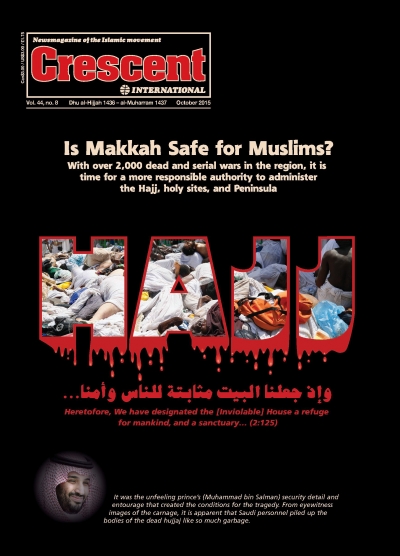



The Saudis cannot be left to manage the affairs of Hajj. They are unfit physically and mentally to discharge this great responsibility. It should be taken over by a group of learned scholars backed by properly trained professionals.
very year as leader of the Ummah, the Rahbar Imam Seyyed Ali Khamenei delivers a message to the hujjaj (pilgrims) gathered in Arafat. This year’s message has special significance because of developments in the Muslim world whether in Makkah, Al-Quds, Yemen, Syria, Iraq, Bahrain, Burma or elsewhere.
Another disaster has struck pilgrims in Makkah. This time a construction crane collapsed inside the Masjid al Haram as pilgrims were busy performing the tawwaf. At least 107 pilgrims were killed and another 238 injured. The floor of the Haram was soiled with blood in the most holy of Islam's places...
An estimated two million Muslims from all over the world will perform the annual pilgrimage of Hajj this year. The most challenging of all the ‘ibadat, the Muslims’ ordeal begins before they set foot in Makkah. Allah (swt) says in the noble Qur’an, “Pilgrimage to Allah’s House is a duty unto mankind, for those who have the means [physical and financial] to undertake the journey” (3:97).
Just returned from Hajj, this writer confirms that the Saudis are creating divisions among Muslims by separating them based on nationality and wealth.
Every year the Rahbar, Imam Seyyed Ali Khamenei, as leader of the Islamic Ummah, delivers his message to those assembled in Arafat for Hajj. In following the Sunnah of the noble Messenger (pbuh), his message also touches on the burning issues facing the Ummah. Here is the full text of this year's message.
The manner in which Hajj has been emptied out of its Qur’anic basis and turned into mere ritual by the Saudis poses a major challenge to the Ummah. Getting rid of the Saudi occupiers of the Haramayn is the most pressing problem facing the Islamic movement.
Every year the Rahbar, as leader of the Islamic Revolution, delivers his message to the hujjaj in Makkah. This year, his message has particular resonance because of the Islamic awakenings sweeping the Muslim East and attempts by Islam’s enemies to subvert these noble efforts by entangling them in petty squabbles. He describes Hajj as a process of self-reform and an opportunity to reform the Ummah.
In the last days of the Ottoman Empire, the people of the Arabian Peninsula had gone back to their pre-Islamic tribal existence of warfare and banditry. This was the time of European intrusion into the Muslim World, a world that became the victim of a web of international intrigue the like of which the world had not as yet seen.
1The news came that Saudi Arabia has detained for four to five days at two of its international airports without adequate food or drink and under deplorable condition, and then turned back more than a thousand of our women pilgrims who were not accompanied by a Mahram, a husband or a non-marriageable close relative.
The House of Saud is determined to empty Hajj of its Qur’anic and Prophetic content. Will the Ummah remain a silent spectator in this gross deviation from the message of the Qur’an and Hajj?
Sister Salina Khan challenges the conventional, ritualistic approach to performing Hajj and explains her experiences during the last Hajj.
It is that time of the year again. Muslims from far and near prepare themselves for the lifelong journey to Ibrahim’s (a) final destination, to the emigre home of Hajar, to the life-threatened birth of Isma‘il (a), to the expatriate city of Muhammad (pbuh) and to the cradle of Islam — to Makkah al-Mukarramah.
Some two million Muslims are assembled in Makkah al-Mukarramah for the performance of Hajj. If the past is any guide, this Hajj will also be performed as a set of rituals in which the hujjaj go through various motions without realizing why they are doing this.
As a symbol of Islamic unity and honour and the emblem of monotheism and spirituality, the sacred Ka‘bah, during the Hajj season, is host to the ardent and hopeful hearts, who come hurrying from all over the world to the birthplace of Islam in response to the call of the Glorified Lord.
This writer has never had the privilege of performing Hajj. It may be many years before I am able to do so, although I hope and pray to have the opportunity before the end of my time on this earth, insha’allah.
There are two aspects to every act of ‘ibadah in Islam: its physical (ritualistic) form, and its higher spiritual, communal, social, and moral purpose. The salah, for instance, is performed in a certain way but its true import lies in the fact that it is our direct link (sila) with Allah (swt).
Once again the Land of Revelation has gathered legions of committed servants for its annual banquet. In the birthplace of Islam and the Holy Qur’an, eager hearts from throughout the world are now engaged in such rites which indeed show a sign of the eternal lesson of Islam and the Holy Qur’an to mankind: symbolic steps for implementing and applying such a lesson.
The entire journey from beginning to end is like a dress rehearsal for the final journey we will all make to Allah. In the weeks preceding my departure, like all hujjaj, I began calling and emailing family and friends, acquaintances and enemies, asking them all for their forgiveness for any hurt or offence I may ever have caused them.

